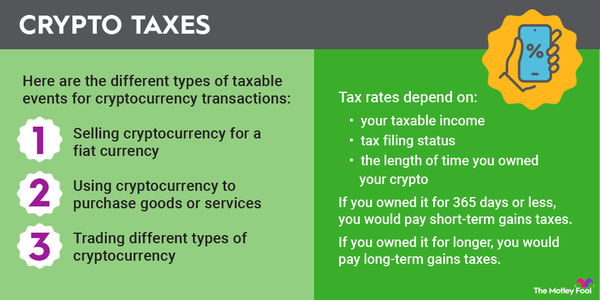Bitcoin (CRYPTO:BTC) has been one of the most exciting investments of the 2000s. One Bitcoin was worthless when it launched in 2009, but 15 years later, its price surpassed $100,000. Now, Bitcoin exchange-traded funds (ETFs) have made it easier to invest.
After years of waiting, the U.S. Securities and Exchange Commission (SEC) approved funds based on Bitcoin's spot price in 2024. The move increased Bitcoin's price and its appeal for institutional investors. Here's what you need to know and the best Bitcoin ETF options.

Investing in Bitcoin and other cryptocurrencies directly requires some extra work over and above what's involved in investing in stocks, bonds, and the like. Many traditional brokerage firms don't support cryptocurrency trading. If yours doesn't, and you want to buy crypto, you'd need an account with a crypto trading exchange. And if you want to store your crypto yourself, you need a crypto wallet.
A workaround for these issues is buying a Bitcoin ETF or fund that trades on a stock exchange so your investment in Bitcoin can be held in the same account as your other stocks, bonds, and traditional investment securities.
What are Bitcoin ETFs?
What are Bitcoin ETFs?
Bitcoin ETFs are funds that trade on a stock exchange and attempt to track the performance of Bitcoin. When you buy an ETF, you aren't buying the underlying investment directly. Rather, you're buying shares of a fund that either invests in or attempts to mimic the performance of a particular security or index -- Bitcoin, in this case.
Until 2024, there were no ETFs that were able to directly own Bitcoin. That's because trading in cryptocurrency and other digital currencies was still unregulated by the SEC. However, a number of ETF and investment firms have had their applications approved by the SEC to launch ETFs that directly purchase Bitcoin (including Cathie Wood's Ark Invest).
Bitcoin vs. Bitcoin ETFs
Bitcoin vs. Bitcoin ETFs
Why buy a Bitcoin ETF instead of Bitcoin directly? After all, even the best fund isn't going to perfectly track the crypto's price since there are fees built into ETFs to pay for management.
Besides avoiding the added complexity of opening an account with a crypto exchange and safely storing Bitcoin, one big reason to opt for an ETF is that it's easier to get Bitcoin investment exposure in an individual retirement account (IRA). At this point, only a few specialty investment companies support crypto trading within an IRA account. But if you want to keep Bitcoin with the rest of your investments, buying a fund or ETF might be your ticket.
List of 5 Bitcoin ETFs
5 Bitcoin ETFs and funds for 2025
Before SEC approvals in January 2024, Bitcoin funds were only generally available using futures contracts in their portfolios. Bitcoin ETFs can now directly purchase Bitcoin and hold it in custody (or outsource the holding of the Bitcoin to a third party). Here are five options to consider:
| ETF Name | Assets | Description |
|---|---|---|
| iShares Bitcoin Trust (NASDAQ:IBIT) | $51.0 billion | From investment giant BlackRock, this was the most successful Bitcoin ETF of 2024. |
| Grayscale Bitcoin Mini Trust ETF (NYSEMKT:BTC) | $3.6 billion | A low-cost alternative to Grayscale's larger Bitcoin trust, with one of the lowest expense ratios among Bitcoin ETFs. |
| Fidelity Wise Origin Bitcoin Fund (NYSEMKT:FBTC) | $19.2 billion | A Bitcoin ETF from one of the world's largest investment managers. |
| ARK 21Shares Bitcoin ETF (NYSEMKT:ARKB) | $4.5 million | Ark Invest, Cathie Wood's investment firm, making its foray into Bitcoin with an ETF sponsored by crypto company 21Shares. |
| Franklin Bitcoin ETF (NYSEMKT:EZBC) | $725.9 million | A smaller Bitcoin ETF with a low annual fee. |
1. iShares Bitcoin Trust
The iShares family of ETFs, from investment management titan BlackRock (BLK 2.36%), was among the first Bitcoin spot price ETFs approved by the SEC. It also quickly emerged as one of the largest Bitcoin funds, scooping up more than $50 billion in investor assets under management (AUM) in its first year.
While iShares takes care of the management of the passive investment vehicle, Coinbase's (COIN 1.47%) Custody service actually holds the Bitcoin that makes up the ETF's portfolio of assets. In fact, Coinbase Custody scooped up a large share of Bitcoin from SEC-approved ETFs.
iShares is a well-established ETF provider with decades of experience. The iShares Bitcoin Trust (IBIT 1.08%) is also an affordable option, although it's not cheapest. It has a 0.25% management fee (or $2.50 in annual fees for every $1,000 invested).
2. Grayscale Bitcoin Mini Trust ETF
Grayscale has multiple Bitcoin ETFs, but in this case, bigger isn't better. The Grayscale Bitcoin Trust ETF (GBTC 1.05%) is one of the largest Bitcoin ETFs, with more than $50 billion in AUM at the end of 2024. It also charges a hefty 1.5% annual fee ($15 each year for every $1,000 invested).
The Grayscale Bitcoin Mini Trust ETF is the more affordable version, and it's also one of the most affordable Bitcoin ETFs currently available. It has an expense ratio of just 0.15%, so you pay $1.50 each year for every $1,000 invested.
3. Fidelity Wise Origin Bitcoin Fund
Fidelity is another global investment giant and was among the first to dabble in the nascent cryptocurrency industry. It launched a cryptocurrency exchange in 2023, so an ETF on the top cryptocurrency, Bitcoin, is a natural fit.
The Fidelity Wise Origin Bitcoin Fund (FBTC 1.07%) started trading in January 2024. It has an annual expense ratio of 0.25%. Given Fidelity's long tenure in the investment world, the ETF is worth considering.
4. ARK 21Shares Bitcoin ETF
It comes as no surprise that Cathie Wood's Ark Invest would also offer a Bitcoin ETF. Wood and company are known for investing in disruptive new technology, and blockchain and Bitcoin are no exception.
As the name implies, the ARK 21Shares Bitcoin ETF (ARKB 1.09%) is sponsored by cryptocurrency investment outfit 21Shares. This is also an affordable option since this Ark ETF has a 0.21% annual expense ratio.
5. Franklin Bitcoin ETF
Rounding out the list is an ETF from Franklin Templeton. Its Franklin Bitcoin ETF (EZBC 0.96%) was another of the first to receive SEC approval, and it has a low annual fee of 0.19% ($19 each year for every $1,000 invested). Like other funds on this list, this Franklin ETF is using Coinbase Custody for its Bitcoin storage.
Related investing topics
Choose the right Bitcoin investment product carefully
Bitcoin ETFs and funds aren't a perfect replacement for direct investment if you want exposure to the largest digital currency. However, there are benefits to selecting an ETF since it can be a workaround for getting Bitcoin's performance inside your IRA. Just remember to take a measured approach, given the inherent volatility in crypto prices.
FAQs
FAQs about Bitcoin ETFs
Which ETF is best for Bitcoin?
Some of the best Bitcoin ETFs include the iShares Bitcoin Trust, Grayscale Bitcoin Mini Trust ETF, and the Fidelity Wise Origin Bitcoin Fund. The best Bitcoin ETF to choose will depend on various factors, like the annual fee, the reputation of the investment manager and its custodian, and the fund's total investor assets under management.
Does a Bitcoin ETF exist?
There are now many Bitcoin ETFs that invest in Bitcoin itself, based on the top cryptocurrency's actual daily price movements. Most of the top investment management firms offer Bitcoin ETFs.
What is the new ETF for Bitcoin?
Some of the new ETFs for Bitcoin include iShares Bitcoin Trust ETF, Fidelity Wise Origin Bitcoin Fund, ARK 21Shares Bitcoin ETF, and Franklin Bitcoin ETF.
What does the approval of Spot Bitcoin Exchange mean?
The U.S. Securities and Exchange Commission (SEC) approved applications for Bitcoin exchange-traded products in early 2024. This means ETFs can hold the cryptocurrency Bitcoin in their portfolio, directly or through a third-party custodian. The approval gives investors an easier way to gain cryptocurrency exposure in their investment accounts.





































